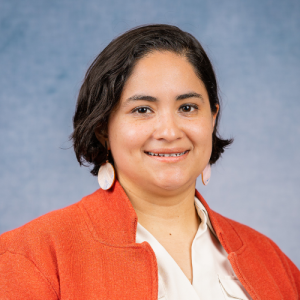Five Minutes With Emi Reyes
 The HAND network is hard at work to address the growing housing affordability challenge across the Capital Region. Five Minutes With is a series highlighting these members and other stakeholders. This informal conversation delves into their recent projects, the affordable housing industry, and more. In this edition, we had the pleasure to chat with Emi Reyes, CEO of the Latino Economic Development Center and HAND Board Member. Take a look at our dialogue below to discover Emi’s commitment to community development, diverse experiences, and insights on cultivating more equitable communities in the area.
The HAND network is hard at work to address the growing housing affordability challenge across the Capital Region. Five Minutes With is a series highlighting these members and other stakeholders. This informal conversation delves into their recent projects, the affordable housing industry, and more. In this edition, we had the pleasure to chat with Emi Reyes, CEO of the Latino Economic Development Center and HAND Board Member. Take a look at our dialogue below to discover Emi’s commitment to community development, diverse experiences, and insights on cultivating more equitable communities in the area.
HAND: The HAND Team is excited to have you on the Board of Directors! Can you tell us a bit about yourself and your past work experience?
ER: I am honored and thrilled to be a part of the HAND Team as a board member! My journey began in Washington DC, where I was born to Salvadoran immigrants. Their hard work and determination instilled in me a deep passion for entrepreneurship and community support. This drive has guided my career, culminating in my current role as the CEO of the Latino Economic Development Center (LEDC).
During my time at Bennington College in Vermont, I co-founded our college’s inaugural student farm, an experience that sparked my interest in working with agricultural entrepreneurs, particularly in Central America. Following my studies, I spent five years with Chipotle Mexican Grill, where I gained valuable insights and experience while managing locations across the DMV area and Albany, NY.
In 2018, I embarked on a new chapter by joining LEDC as an intern in the small business lending department. This led me to the role of loan officer which provided me with invaluable experiences, shaping my understanding of the unique challenges and opportunities faced by small businesses. It’s been an incredible journey, and I’m eager to bring this rich blend of personal and professional experiences to the Board of Directors at HAND. I am committed to leveraging my background and passion to contribute to the growth and success of the organization and its mission.
HAND: Tell us about how you plan to use your experience to inform HAND’s Board of Directors and staff.
ER: Over the years, I have cultivated strategic leadership skills from my work at LEDC where we constantly navigate challenges, identify opportunities, and execute strategic initiatives to drive growth and impact in our community. Also, working with diverse stakeholders, including government entities, nonprofit organizations, and community members, has allowed me to understand how to effectively engage with various groups. I plan to employ this experience in order to create meaningful dialogue and collaboration among HAND’s stakeholders, ensuring that our initiatives align with the needs and aspirations of the communities we serve.
HAND: What are you most looking forward to over the coming months at HAND? Are there any projects that you are particularly excited about?
ER: I am very excited about the GenerationHAND program. I believe that we have such an amazing opportunity to help bring up the next generation of community development professionals and leaders. Being able to offer our GenerationHAND Braintrust Committee’s experience to the industry’s emerging leaders is something that I am excited and proud to be able to offer.
HAND: One of the initiatives you’ll play a key role in is our GenerationHAND Braintrust Committee. What is one piece of advice you would give to professionals who are just starting out in this industry?
ER: One big piece of advice I’d give to up-and-coming professionals would be to build a diverse network that offers an array of perspectives and knowledge in a specific industry. In my experience working in the non-profit and CDFI industry, one of the most important things is that collaboration is key. Whether that is with government agencies, local organizations, community leaders, small business owners, or community residents— it is important to be connected to different areas of your field. It doesn’t only help on a personal and professional level, but it also enhances the work of the organization you are working at.
HAND: What is your “why” for working in this industry?
ER: My “why” for being a part of this industry is connected to my strong ties with my neighborhood and my commitment to ensuring that all residents benefit from community development. Growing up in DC, I’ve witnessed the progress and growth, but I’ve also seen that it hasn’t reached everyone. Many long-time residents are struggling with rising costs and limited opportunities.
I believe that true community development involves fostering an environment where all individuals can prosper. By working in this industry, we assume a pivotal role in closing these disparities by offering accessible financial resources and services to marginalized communities, enabling them to actively engage in the positive transformation and development occurring within their surroundings.
Being a part of this sector allows me to collaborate with other local organizations, community leaders, and residents to identify their specific needs and offer financial assistance or counseling to ensure they get exactly what they need. This work not only supports individual success stories but also contributes to the overall resilience and vitality of the community.
HAND: What might you be doing if you weren’t working in this space?
ER: If I weren’t working in this space, I believe my passion for the food industry would still guide my path. Growing up in a family of restaurant owners profoundly influenced my appreciation for the intricacies of the food lifecycle, from cultivation to cooking. During my time in Vermont, I worked in a restaurant and immersed myself in the kitchen environment, which I found exhilarating due to its intensity and demand for quick thinking.
I envision myself exploring opportunities that align with my love for food and the challenges of the kitchen. Whether it’s venturing into culinary entrepreneurship, sustainable agriculture, or culinary arts education, I am drawn to spaces that allow me to channel my full brainpower towards finding innovative solutions and contributing to the food industry in meaningful ways.





Leave a Reply
Want to join the discussion?Feel free to contribute!